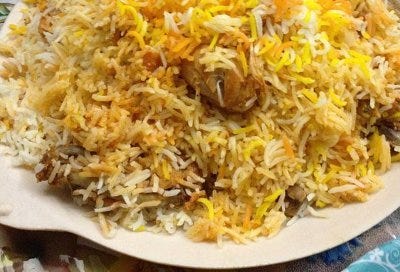There is no widely agreed upon etymology (or spelling) of the word Biryani. The commonly accepted explanation is that it comes from Persian - which was the language of the court for most of South and Central Asia for multiple centuries.
The two most popular origins are:
From Beriyan (بریان), the Persian word for ’to fry’ or ’to roast'. The Oxford dictionary as well as Cannon and Kaye’s ‘The Persian Contributions to the English Language’, propose this origin.
From Birinj (برنج), the Persian word for rice. This is delightful. Biryani is rice, and rice is biryani. Why would anyone eat just plain rice, anyway? Pratibha Karan’s book, Biryani, subscribes to this idea.
The spelling is all over the place too - commonly between biryani (or biriyani or biriani) - and the widespread use of roman letters and inconsistent spelling across the subcontinent means that every variant of a word starting with a ‘bir’ and ending in a ‘ni’ have been used on a signboard somewhere. The Malay and Singaporean straits variations prefer the beryani spelling. The Urdu spelling is consistently بریانی, with the Devanagari one being बिरयानी.
The word Pilaf comes from either the Turkish pilav, or the Sanskrit word pulaka, via the Persian pulaw. Paella comes from the word for a pan in the Valencia region.
Many East Asian cultures use variations of the words for ‘pot rice’ for a single rice-and-meat dish - such as the Japanese Kamameshi (釜飯), the Chinese guō fàn (鍋飯), the Cantonese bo zai fan (煲仔飯), and the Korean Dolsot Bibimbap (돌솥 비빔밥). West Africans have a similar concept with the words for ‘one pot’ - the variations of Jollof Rice.
I was pleasantly surprised to get the biryani.substack domain. Biryani.com is probably a cybersquatter. Pratibha Karan’s 2009 effort is the most popular book with the one-word title. It’s a collection of recipes from all parts of India. There’s only one movie with the single-word name, a 2013 dark comedy in Tamil.



